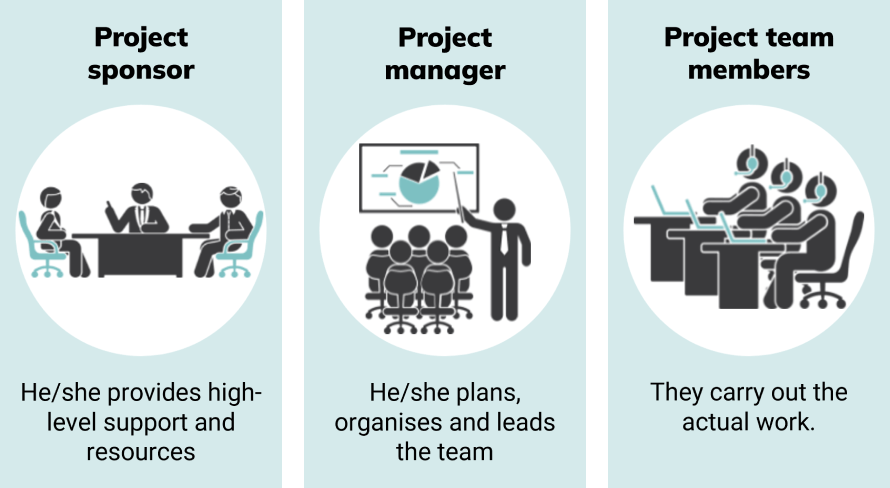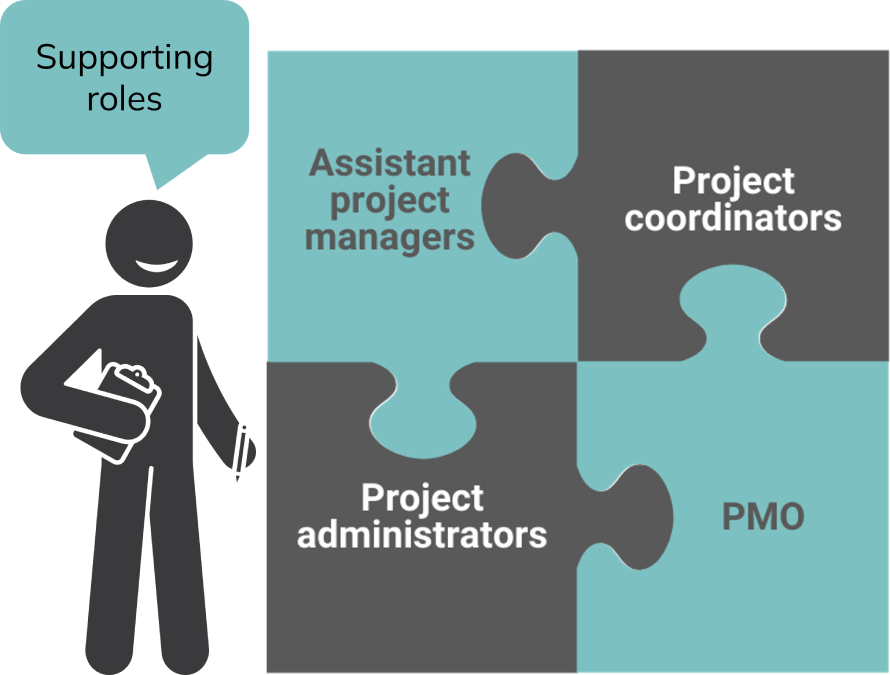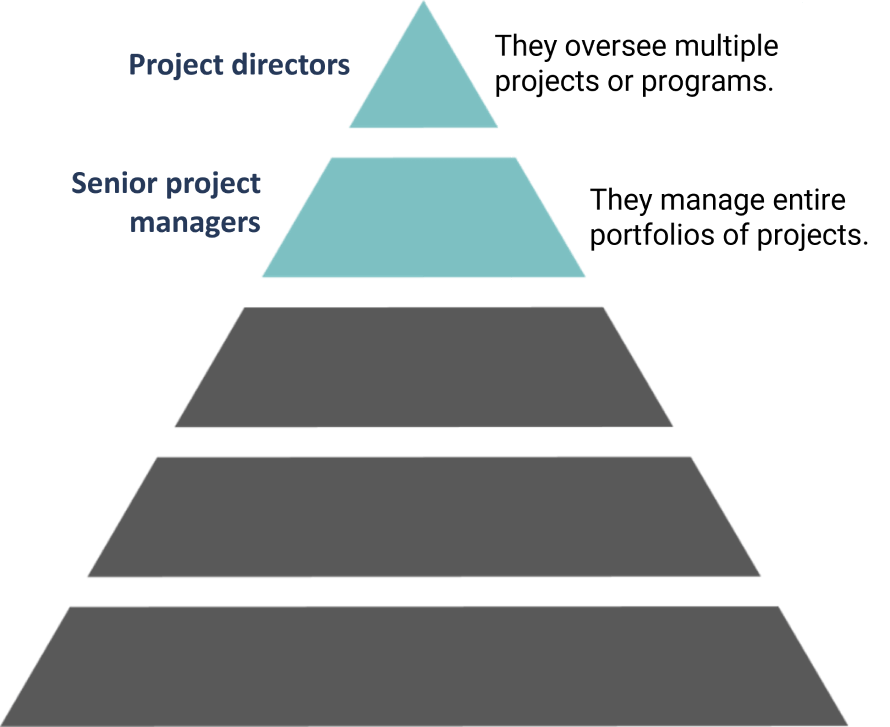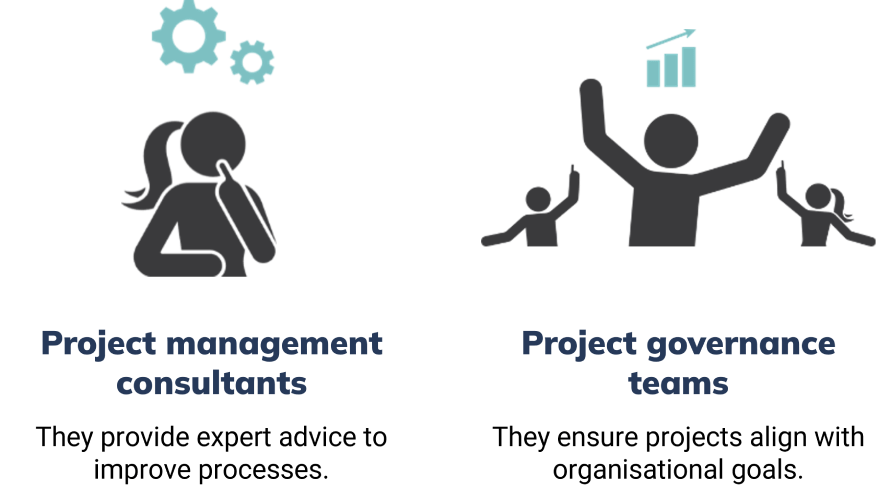
Introduction
Project management is the backbone of successful organisational initiatives. It involves coordinating resources, tasks, and people to achieve specific objectives within defined constraints. At the heart of effective project management lies a clear understanding of the various roles involved. From project managers to team members, each position contributes uniquely to the project’s success. This article aims to explore ten essential project management roles, their responsibilities, and their impact on project outcomes. By grasping these roles, professionals can:
- Enhance team collaboration
- Improve project efficiency
- Boost overall project success rates.
Whether you’re a seasoned professional or new to project management, this guide will provide valuable insights into the diverse roles that drive project excellence.
Core project management roles

Project manager
The project manager serves as the linchpin in any project, orchestrating resources and guiding the team towards defined objectives. Their primary responsibilities include:
- Planning and defining project scope
- Creating and managing budgets
- Developing schedules and timelines
- Allocating resources effectively
- Mitigating risks and resolving issues
- Communicating with stakeholders.
Successful project managers possess a blend of technical and interpersonal skills:
- Leadership: Inspiring and motivating team members
- Communication: Clearly conveying ideas and expectations
- Problem-solving: Addressing challenges efficiently
- Adaptability: Adjusting strategies as needed
- Organisation: Managing multiple tasks simultaneously.
The project manager’s role is crucial for project success. They ensure alignment with organisational goals, maintain project momentum, and foster a collaborative environment. By effectively balancing constraints such as time, budget, and scope, project managers significantly increase the likelihood of achieving desired outcomes and delivering value to stakeholders.
Project sponsor
The project sponsor plays a crucial role in initiating and supporting projects throughout their lifecycle. This executive-level position champions the project, ensuring its alignment with organisational objectives. Key responsibilities include:
- Securing funding and resources
- Approving project charter and scope
- Making high-level decisions
- Resolving escalated issues.
Sponsors act as a bridge between the project team and senior stakeholders, communicating project value and progress. They hold ultimate accountability for the project’s budget and outcomes.
The sponsor-project manager relationship is vital for success. While the project manager handles day-to-day operations, the sponsor provides:
- Strategic guidance
- Political support
- Removal of organisational obstacles.
This collaborative partnership ensures the project remains on track, adequately resourced, and aligned with business goals. Effective sponsors significantly increase the likelihood of project success and stakeholder satisfaction.
Project team members
Project team members form the backbone of any project, bringing diverse skills and expertise to achieve project objectives. These professionals may include:
- Developers and engineers
- Designers and creative specialists
- Quality assurance testers
- Business analysts
- Subject matter experts.
Team members’ primary responsibilities encompass:
- Executing assigned tasks within specified timelines
- Maintaining quality standards
- Reporting progress and challenges to project managers
- Contributing ideas for problem-solving and innovation.
Effective collaboration is crucial for project success. Team members must:
- Communicate clearly and consistently
- Share knowledge and resources
- Support colleagues in achieving common goals
- Adapt to changing project requirements.
By fostering a culture of open communication and mutual respect, project teams can overcome challenges more efficiently. This collaborative approach enhances productivity, creativity, and overall project outcomes, ultimately contributing to the organisation’s strategic objectives and success.
Supporting project management roles

Assistant project manager
On large projects, the assistant project manager serves as a crucial support to the primary project manager, helping to ensure smooth project execution. Their responsibilities typically include:
- Coordinating project activities and resources
- Monitoring project timelines and milestones
- Assisting in budget management and cost control
- Facilitating communication among team members and stakeholders
- Preparing project documentation and reports.
Working closely with the project manager, the assistant:
- Learns advanced project management techniques
- Gains exposure to high-level decision-making processes
- Develops leadership skills for future career advancement.
This collaborative relationship allows for efficient task delegation and comprehensive project oversight. The assistant project manager’s role is essential in large-scale or complex projects, providing additional management capacity and ensuring no critical details are overlooked.
Project coordinator
The project coordinator plays a vital supporting role in facilitating smooth project operations. Their primary duties include:
- Scheduling meetings and managing project calendars
- Maintaining project documentation and records
- Coordinating logistics for project activities
- Tracking project progress and reporting updates.
In supporting the project manager and team, coordinators:
- Act as a central point of communication
- Assist in resource allocation and management
- Help monitor project budgets and expenses
- Contribute to risk identification and mitigation efforts.
By efficiently handling administrative tasks, project coordinators enable the project manager to focus on strategic decisions. Their attention to detail and organisational skills ensure that project workflows remain streamlined and effective, contributing significantly to overall project success and team productivity.
Project administrator
The project administrator fulfils another crucial supporting role by providing administrative support. Their key responsibilities encompass:
- Managing project-related paperwork and digital files
- Updating and maintaining project management software
- Assisting with financial tracking and budget reports
- Coordinating team schedules and resource allocation.
Maintaining comprehensive project documentation is paramount to their role. This includes:
- Creating and organising project plans
- Compiling progress reports and status updates
- Archiving important communications and decisions
- Ensuring compliance with organisational policies.
Through meticulous record-keeping, project administrators provide a clear audit trail of project activities. This documentation serves as a valuable resource for decision-making, performance evaluation, and knowledge transfer for future projects, ultimately contributing to the organisation’s long-term success and efficiency.
Senior project management roles

Senior project manager
A senior project manager assumes advanced responsibilities, leveraging extensive experience to guide complex initiatives. Their role typically involves:
- Overseeing multiple interconnected projects or programmes
- Developing and implementing strategic project management methodologies
- Mentoring junior project managers and team members
- Managing high-stakes stakeholder relationships.
These professionals possess:
- Proven track record of successful project deliveries
- Advanced certifications (e.g., PMP, PRINCE2 Practitioner)
- In-depth understanding of industry-specific challenges.
In overseeing complex initiatives, senior project managers:
- Align projects with organisational objectives
- Manage large-scale budgets and resources
- Mitigate risks across multiple project domains
- Drive innovation and process improvements.
Their strategic thinking and leadership skills enable them to navigate intricate project landscapes effectively. By balancing competing priorities and optimising resource allocation, senior project managers significantly enhance an organisation’s project management capabilities and overall performance.
Project director
A project director occupies a senior leadership position, overseeing entire project portfolios within an organisation. Their primary responsibilities include:
- Aligning project portfolios with strategic business objectives
- Ensuring optimal resource allocation across multiple projects
- Developing and implementing project management standards and methodologies
- Evaluating and reporting on overall portfolio performance.
In managing resources and stakeholder relationships, project directors:
- Coordinate cross-functional teams and departments
- Negotiate with senior executives and external partners
- Balance competing priorities and resource demands
- Identify and mitigate portfolio-wide risks.
Project directors play a crucial role in:
- Maximising return on investment for project initiatives
- Fostering a culture of continuous improvement
- Mentoring and developing project management talent.
Their strategic vision and leadership skills are essential for driving organisational success through effective project portfolio management. By optimising resource utilisation and stakeholder engagement, project directors significantly enhance an organisation’s project delivery capabilities.
Specialised project management roles

Creative project manager
A creative project manager specialises in overseeing projects that require innovative and artistic elements. Unique aspects of their role include:
- Facilitating brainstorming sessions and idea generation
- Managing creative workflows and approval processes
- Ensuring brand consistency across deliverables
- Balancing client expectations with creative vision.
To effectively manage creative projects, these professionals must possess:
- Strong visual and design sensibilities
- Excellent communication skills to articulate abstract concepts
- Flexibility to accommodate creative iterations
- Ability to translate client needs into creative briefs.
Balancing creativity with project constraints requires:
- Setting realistic deadlines that allow for creative exploration
- Managing budgets while maintaining quality standards
- Protecting the creative team from unnecessary distractions
- Adapting project methodologies to suit creative processes.
By fostering an environment that nurtures creativity while adhering to project parameters, creative project managers ensure the delivery of innovative and impactful solutions within established timelines and budgets.
Project management consultant
A project management consultant offers an external perspective and specialised expertise to organisations seeking to enhance their project management capabilities. Their role provides:
- Objective assessment of current project management practices
- Strategic recommendations for process improvements
- Implementation of industry-leading methodologies and tools
- Tailored training programmes for project teams.
Typical responsibilities include:
- Conducting project audits and health checks
- Developing customised project management frameworks
- Guiding organisations through complex project challenges
- Mentoring internal project managers.
Benefits of engaging a project management consultant:
- Access to cutting-edge industry knowledge and best practices
- Improved project success rates and efficiency
- Enhanced risk management and mitigation strategies
- Accelerated adoption of effective project management techniques.
By leveraging their extensive experience across various industries, project management consultants help organisations optimise their project delivery capabilities, leading to improved business outcomes.
Project governance
Project governance ensures effective oversight and strategic alignment of projects within an organisation. Key components include:
Steering committee:
- Provides high-level direction and decision-making
- Approves major project changes and resource allocation
- Ensures alignment with organisational objectives.
Project Management Office (PMO):
- A PMO develops and maintains project management standards
- Offers support and guidance to project teams
- Monitors project performance and portfolio health.
These governance structures are crucial for:
- Maintaining consistency across projects
- Facilitating informed decision-making
- Optimising resource utilisation
- Ensuring regulatory compliance.
Effective project governance enhances project success rates, improves stakeholder satisfaction, and maximises the value delivered by project initiatives.
Conclusion
Understanding diverse project management roles is crucial for organisational success. Each position contributes uniquely to project outcomes. We encourage readers to reflect on their skills and interests, identifying where they might fit within this framework. By recognising these roles, professionals can enhance their contributions and advance their project management careers.
FAQs
What’s the difference between a project manager and coordinator?
Project managers oversee entire projects, making strategic decisions. Coordinators focus on administrative tasks, supporting the project manager.
How does a project sponsor contribute to success?
Sponsors provide resources, remove organisational obstacles, and ensure strategic alignment. They champion the project at executive levels.
What skills are essential for becoming a successful project manager?
Key skills include leadership, communication, problem-solving, organisation, and adaptability. Technical knowledge in the project’s field is also valuable.
How can I start a career in project management?
Begin with entry-level roles like project coordinator. Pursue relevant certifications (e.g., PRINCE2, PMP). Gain hands-on experience in project-based work. Develop both technical and soft skills.
Infographic









